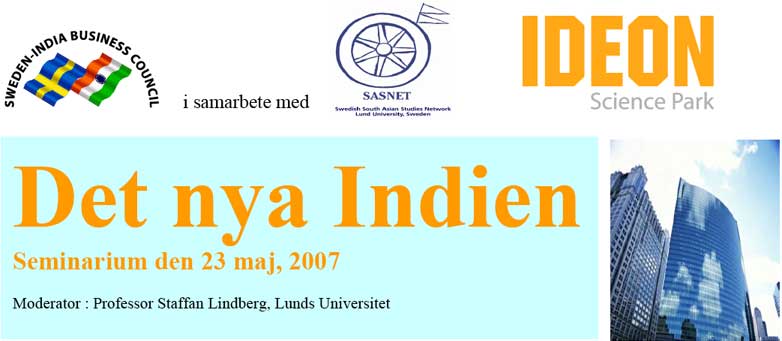SWEDISH SOUTH ASIAN STUDIES NETWORK
Successful Business Seminar in Lund about the New India
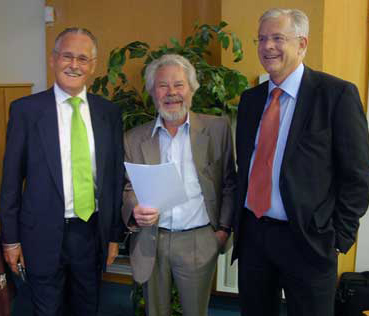 |
| Stig Victorin, SIBC, Staffan Lindberg, SASNET, and Ingemar Ljungdahl, Telelogic. Key persons at the successful business seminar in Lund. |
Read the full programme (as a pdf-file)
Venue: Ideon Science Park, 23 May 2007.
The seminar was organised jointly by
the Sweden-India Business Council (SIBC),
the Swedish South Asian Studies Network (SASNET)
and Ideon
Science Park in Lund. Stig Victorin, Senior
Advisor to SIBC, and General Manager for TradeAsia Consulting,
was the driving organiser behind the seminar.
Staffan Lindberg, Professor of Sociology at Lund
University (and SASNET Director) was the moderator.
There were about 50 participants, mostly from business
companies in southern Sweden, and some people from
Lund University.
”The New India”, referred to in the title
of the seminar, is related to the dramatic changes that have taken
place in the Indian economy during the last 25 years, Prof. Staffan
Lindberg stated in his opening lecture.
Today the overall growth
rate is about 8-9 percent per annum and at the same time the proportion
of poor people fast reducing, he said.
After the Green revolution,
a development in services was the first to come. More
lately, Indian industry has started a phenomenal growth in
all sectors. A development partly triggered by the liberalisation
of the Indian economy in the beginning of the 1990s, but something
that had actually begun already in the mid-80s.
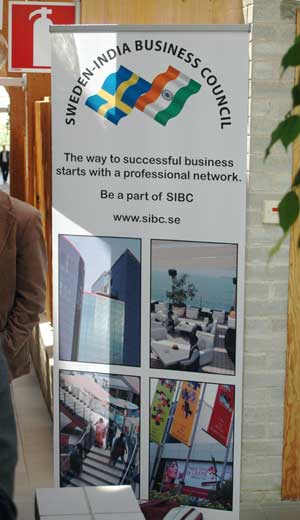 India
has a large home market, but receives much less direct foreign
investments (DFI) than China, which means that there is a great
potential for new investments and collaborations. With this development
the Indian middle class is growing rapidly creating purchasing
power for a wide range of goods and services. It is today variously
estimated somewhere between 60 and 200 million people, depending
on how the definition of ”middle class” is made.
India
has a large home market, but receives much less direct foreign
investments (DFI) than China, which means that there is a great
potential for new investments and collaborations. With this development
the Indian middle class is growing rapidly creating purchasing
power for a wide range of goods and services. It is today variously
estimated somewhere between 60 and 200 million people, depending
on how the definition of ”middle class” is made.
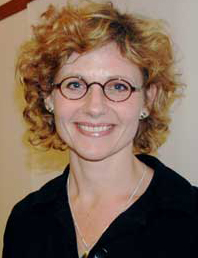 For
example, there are currently 200 million mobile phone owners in
India, a figure that is growing with about 6 million every month.
For
example, there are currently 200 million mobile phone owners in
India, a figure that is growing with about 6 million every month.
Nokia has won around 70 % of the market, but Sony
Ericsson is
now trying to take up the competition with new models specially
made for the Indian market. Sony Ericsson opens up a factory in
Chennai during 2007, and the company hopes to increase its market
share from about 5 %.
The trick is to design new and thrilling
models attracting the young
generation, said Susanna Bill (photo
to the left),
Lund based Innovation Manager in the company.
Telelogic is a Malmö based company
established in 1983, working with Integrated System Management
for both private and public businesses and organisations. The car
industry is one of their big customers. The company is now well
established in India, in Bangalore where Telelogic has about 300
employees. The Indian employees are highly qualified and has been
away for training in Europe and the US. They now work on the development
of new systems applications in three important fields in India.
The Indian company offers god value for the money since wages are
lower and the employees highly skilled.
Ingemar Ljungdahl, Technical
Director of the company, in his lecture was very optimistic about
the future of the firm in India.
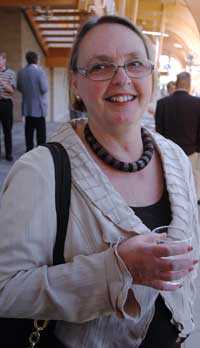 But
doing business in India requires patience and a knowledge of cultural
codes. Anne-Charlotte
Sukhia (photo to the
left) from ACS
Interkulturell Utbildning held a very interesting
presentation of the differences in business cultures between India
and Sweden. Business and friendship cannot easily be separated
in India but also takes time to develop. Gifts to family members
and children are highly appreciated, but any mention of 'cuts'
or other favours is highly detested. Indians have had enough of
'Bofors' scandals and wants to be taken seriously.
But
doing business in India requires patience and a knowledge of cultural
codes. Anne-Charlotte
Sukhia (photo to the
left) from ACS
Interkulturell Utbildning held a very interesting
presentation of the differences in business cultures between India
and Sweden. Business and friendship cannot easily be separated
in India but also takes time to develop. Gifts to family members
and children are highly appreciated, but any mention of 'cuts'
or other favours is highly detested. Indians have had enough of
'Bofors' scandals and wants to be taken seriously.
With strong friendship ties and
sharing of gains and losses, Indians however become very reliable
partners in expanding business. They want to stay in the firm,
the turnover of employees in Swedish-Indian firms is low and makes
for stable expansions. And once getting used to the functioning
of Swedish companies, Indians like flat and effective organisations
and they perform durifully in this setting. This is so despite
the fact that they are all very embedded in caste and family-kinship
networks (more than 95 % marry within their own community). Friends
are classificatory kin and intimate relations develop between men,
like holding hands while walking in the street. However, close
body contact with the opposite sex is not tolerated.
Otherwise
things fall out nicely, Ann-Charlotte Sukhia says. Indian institutions
and the legal system are very British and stable, the democratic
system is very secure, the language of communication is English,
and it is in fact rather easy for Europeans to learn Hindi,
since it is also an Indo-European language.
With the technical
skill and organisational efficiency that Swedish business companies
possess, it should be easy to invest more in India and get access
to big and fast expanding markets. In the initial phase, companies
already established there could offer networks of advisors and
consultants to set a stable course for the journey to India.
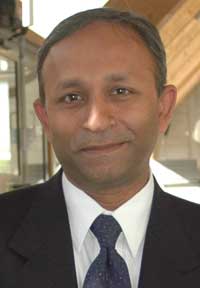 Staffan Lindberg, text
Staffan Lindberg, text
Lars Eklund, photos
The daily newspaper Sydsvenska Dagbladet in Malmö covered the seminar extensively, publishing two articles in the paper on Thursday 24 May 2007. The articles, written by the journalist Elisabeth Andersson, were titled ”Växande indiskt intresse för Sverige” (based on interviews with Mr. Aditya Prakash, Stockholm based Representative for the Invest in Sweden Agency, ISA, and Mr. Sarbajit Deb (photo to the right), Copenhagen based Nordic Area Director for Larsen & Toubro Infotech Limited); and ”…och nu storsatsar Sony Ericsson på indiska telefonkunder” (based on Susanna Bill’s lecture). Read the articles (in Swedish, as a pdf-file)
Lunds Universitet Meddelar (LUM), the Lund University
magazine, published an article about the seminar in its 6/2007
issue. The journalist Göran Frankel has written an article
titled ”Indien kommer starkt”. Read
the article (in Swedish, as
a pdf-file) ![]()
SASNET - Swedish South Asian
Studies Network/Lund University
Address: Scheelevägen 15 D, SE-223 70 Lund, Sweden
Phone: +46 46 222 73 40
Webmaster: Lars Eklund
Last updated
2011-01-18
